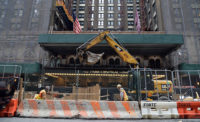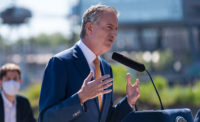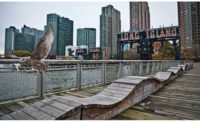Coronavirus and Construction
New Jersey, Second in U.S. COVID-19 Case Growth, Shuts Non-Essential Construction

New Jersey now becomes the latest state to join the ranks of those shutting down more construction projects as an anti-COVID-19 measure, with a state order halting "non-essential" work in effect since April 10, 8:00pm.
Exceptions to the shutdown outlined in Gov. Phil Murphy's Executive Order 122 include: projects at hospitals and schools, in transportation and utility sectors, for online or "essential" retail businesses, those contracted by federal, state or local government or under a federal deadline, affordable housing, and data centers.
Also still enabled are individual residential projects with five or fewer workers or for work under a "legally binding contract," emergency repairs, and "work needed to safely secure a construction site, and other limited instances," says the order, although the last category is not detailed.
Essential projects are ordered to ban "non-essential" visitors; limit onsite meetings and "work groups" to 10 attendees; stagger work and break start and stop times to limit individuals entering and leaving sites concurrently; restrict individuals in common areas; and require those on sites to wear face masks or coverings and gloves, with employers mandated to provide these to workers.
The order also requires limited sharing of tools, equipment, and machinery; sanitization materials provided to workers and visitors; and "frequent sanitization of high-touch areas," particularly restrooms, breakrooms, equipment and machinery.
It notes the potential of penalties, but with no detail on dollar amounts or scope. Roseland, N.J., construction attorney Rosaria Suriano of Brach Eichler says summons will be issued under laws governing "disordery conduct" and "aiding and abetting" violations. One law, NJSA A:9-49, states that penalties could include fines of up to $1000 or up to six months in jail.
The shutdown comes amid other actions in the order to slow spread of the disease in the state, which had reported on April 14 a total of nearly 65,000 cases and 2,450 deaths, second highest in the U.S., after New York state.
The state Economic Development Authority's online process for small business emergency assistance loans goes live on April 13, despite being oversubscribed already, according to media reports, which say firms should file anyway to the agency and note other financial assistance measures. The $10-million EDA program will provide working capital loans of up to $100,000 to small and mid-size businesses affected by COVID-19 shutdowns
New Jersey had allowed construction to continue last month despite restrictions on other business sectors, as did New York. But as case numbers and industry worker concerns rose, Gov. Andrew Cuomo moved to close all but critical construction on March 27.
The 275 deaths New Jersey recorded on April 7 was its largest one-day total, Murphy said. According to state officials, case numbers are set to peak from April 19 to May 11.
"No one should be working where social distancing isn’t practiced to its fullest extent," he said in his daily briefing. In a tweet, Murphy said "all non-essential construction across New Jersey will CEASE, indefinitely, effective 8:00 PM Friday."
Early Warning, New Rules
Despite the lack of details made public on compliance and enforcement steps and under what "limited instances" work could continue, Murphy had alerted key construction sector officials in the state of the added shutdowns on April 7, says Greg LaLevee, business manager of the 7,000-member Operating Engineers Union Local 825 and vice president of the state building trades council. He said at least two members of his local have tested positive.
*We can’t ignore the health crisis unraveling around us – but at a time when the economy also is struggling, greenlighting specific projects and continuing to put people to work can help stem the tide of economic losses," he said in a nj.com opinion. "Yet in this developing situation, special precaution is more than necessary—it's warranted."
[For ENR’s latest coverage of the impacts of the COVID-19 pandemic, click here]
Under Murphy's order, employers must send home arriving workers with COVID-19 symptoms or those experiencing them during the work day; notify site workers of known exposures "consistent with confidentiality requirements" under federal laws; and "clean and disinfect" jobsites.
Economic Consequences
The shutdown will largely affect retail, commercial and major residential projects in the state, such as in Jersey City, River Edge and other coveted development sites along the state's Hudson River and Atlantic Ocean waterfronts.
"The architectural design and building construction sector of the New Jersey economy is significant. Restrictions on construction can have far reaching economic and social consequences," says Steven B. Lazarus, president of the state American Institute of Architects chapter. "The safe return of a healthy public and a normal building design and construction economy is in the best interest of New Jersey."
Sources say Target Corp. had been set to let contracts for interior renovation at about 20 stores in the state.
The state’s largest retail project, the nearly complete $5-billion American Dream mall and entertainment venue in the northern New Jersey Meadowlands area had already stopped construction on March 20, a spokeswoman told ENR. Parts of the venue had already opened before Murphy closed most retail facilities last month, but new features such as an indoor water park were not yet finished.
Restrictions for non-essential residential or commercial projects that also include educational or affordable housing space were not detailed in the executive order, but Suriano says work at those projects would continue.
She said other non-essential project work also would continue "to secure the site, ensure it is structurally sound and to allow for remediation work if necessary."
The Associated Construction Contractors of NJ, an AGC state chapter that represents 300 firms in building, heavy/highway, utility and site development, said "members and the craftworkers they employ are adhering to the strictest standards of safety laid out by the CDC and US and New Jersey Departments of Labor. "
Group COO Darlene Regina said previously firms have sufficient PPE to work safely and also have donated to hospitals.
LaLevee said work will continue on the $2.7-billion new Terminal One at Newark Liberty International Airport. He said contractors had already been upgrading sanitary and hand washing facilities and have hired outside firms to take workers’ temperatures daily.
The New Jersey Dept. of Transportation also announced on April 9 award of grants totaling $47.3 million to help counties maintain local bridges.
Meanwhile, New Jersey's first of three field hospitals set up by the U.S. Army Corps of Engineers at trade show venues—a 250-bed facility at the Meadowlands Exposition Center in Secaucus, began receiving non-COVID-19 patients on April 6. A 500-bed unit at the New Jersey Convention and Exposition Center in Edison is set to open April 11, with the third 250-bed hospital at the Atlantic City Convention Center to be completed on April 14.
All will handle non-COVID-19 patients, and some with the virus. The Corps also is renovating a 250-bed space in East Orange General Hospital for infected patients.





